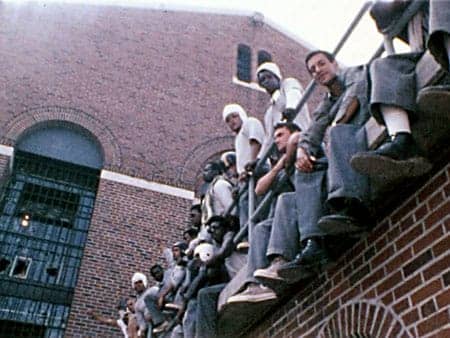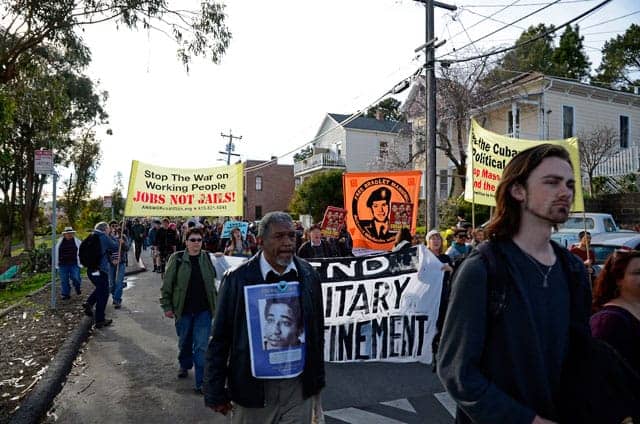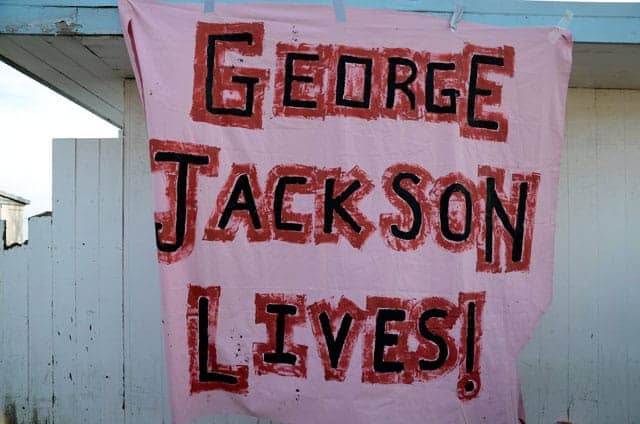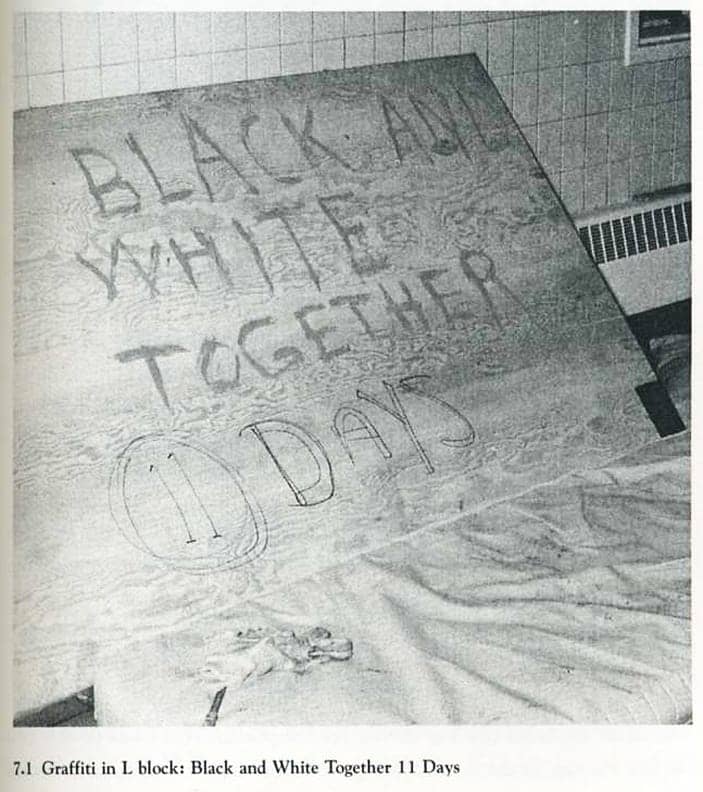It is friday and that means Scission returns to prison and reminds us all to keep in mind the plight of the thousands locked up behind the bars and the walls of this "institutions."
When I was in prison back in the seventies there were, of course, racial divisions amongst prisoners, but not nearly to the extent that they exist today. Don't forget I entered prison only a few years after prisoners at Attica united together in that historic uprising.
Today anything like that would be practically impossible. Prisons have turned into gang fiefdoms and are rife with racial hatred. Race based violence is commonplace. Prison administrators feign concern, but the reality is these divisions make control much more simple. A divided prison population is a prison populations whose anger is most often turned within. The unity needed for a true prison movement within is thus extremely difficult. That is why the post and statement below is so very important.
The call for unity, for a stepping back from the violence may sound utopian to some. It may even seem utopian to me. Still, it also represents some sort of hope, some sort of a re-emergence of sanity. I hope with all my heart that the call you will read here is heard by the thousands of prisoners who can only gain anything at all by working together in struggle. There simply is no other way.
The task toward prisoner unity strikes me as an incredibly tough one, but all power to those taking the first step.
The following is from the San Francisco Bay View.
California prisoners make historic call for peace between racial groups in California prisons and jails
Oakland – Prisoners in Pelican Bay State Prison’s Security Housing Unit (SHU) have announced a push to end all hostilities between racial groups within California’s prisons and jails. The handwritten announcement was sent to prison advocacy organizations. It is signed by several prisoners, identifying themselves as the PBSP-SHU Short Corridor Collective. [Their statement follows this one.]

The Attica rebellion in upstate New York Sept. 9-13, 1971, saw thousands of prisoners take over the prison, protesting intolerable conditions and infuriated by the assassination of George Jackson at San Quentin on Aug. 21, 1971. The secret of their unprecedented strength was their multi-racial solidarity. Here, Black and white prisoners sit on a wall during a meeting called by the organizers.
The statement calls for the cessation of all hostilities between groups to commence Oct. 10, 2012, in all California prisons and county jails. “This means that from this date on, all racial group hostilities need to be at an end,” the statement says.
It also calls on prisoners throughout the state to set aside their differences and use diplomatic means to settle their disputes. The Short Corridor Collective states, “If personal issues arise between individuals, people need to do all they can to exhaust all diplomatic means to settle such disputes; do not allow personal, individual issues to escalate into racial group issues.”
The statement calls for the cessation of all hostilities between groups to commence Oct. 10, 2012, in all California prisons and county jails. “This means that from this date on, all racial group hostilities need to be at an end,” the statement says.
In the past, California prisoners have attempted to collaborate with the Department of Corrections to bring an end to the hostilities, but CDCR has been largely unresponsive to prisoners’ requests. The statement warns prisoners that they expect prison officials to attempt to undermine this agreement.

Occupy San Quentin on Feb. 20, 2012, a major demonstration in support of prisoners, united people across race, class, age and gender dividing lines. – Photo: Alex Darocy, Indybay
Rodriguez has helped broker gang truces throughout the U.S. as well as in other parts of the world. This spring, Rodriguez was involved in a historic truce between gangs in El Salvador leading to a 70 percent drop in violence in that country.
According to Rodriguez, “What is needed now – and where most peace efforts fail – is the meaningful and long-lasting support of society and government, in the form of prison reform, training, education, drug and mental health treatment and proper health care. We need an end to repressive measures that only feed into the violence and traumas.”

George Jackson, a strong advocate of solidarity across race lines, recognized “that in every situation where race has arisen to become a sharp dividing social factor, the hands of the capitalists can be seen pulling the strings, and it is only they who benefit from the conflicts,” writes Kevin “Rashid” Johnson, a present-day prisoner often compared to Jackson. This banner graced the Occupy San Quentin demonstration on Feb. 20, 2012. – Photo: Alex Darocy, Indybay
Azadeh Zohrabi of the Prisoner Hunger Strike Solidarity Coalition sees the agreement as a positive development that stems from last year’s hunger strikes. “While living through some of the worst conditions imaginable, the authors of this statement continue to work for change,” states Zohrabi. “While the prison administration drags its feet on even the most basic reforms, these guys are trying to build peace throughout the system. That says a lot about their humanity and hope.”
Advocates and the Short Corridor Collective are eager to spread the word as far and wide as possible and implement peace plans throughout California’s prisons and jails. “We must all hold strong to our mutual agreement from this point on and focus our time, attention and energy on mutual causes beneficial to all of us [i.e., prisoners] and our best interests,” says the Collective.
“The reality is that, collectively, we are an empowered, mighty force that can positively change this entire corrupt system into a system that actually benefits prisoners and thereby the public as a whole.”
“While living through some of the worst conditions imaginable, the authors of this statement continue to work for change,” states Zohrabi. “While the prison administration drags its feet on even the most basic reforms, these guys are trying to build peace throughout the system. That says a lot about their humanity and hope.”
The PBSP-SHU Short Corridor Collective has strongly requested that its statement be read and referred to in whole. It follows here:
Agreement to end hostilities
Dated Aug. 12, 2012
To whom it may concern and all California Prisoners:
Greetings from the entire PBSP-SHU Short Corridor Hunger Strike Representatives. We are hereby presenting this mutual agreement on behalf of all racial groups here in the PBSP-SHU Corridor. Wherein, we have arrived at a mutual agreement concerning the following points:
1. If we really want to bring about substantive meaningful changes to the CDCR system in a manner beneficial to all solid individuals who have never been broken by CDCR’s torture tactics intended to coerce one to become a state informant via debriefing, that now is the time for us to collectively seize this moment in time and put an end to more than 20-30 years of hostilities between our racial groups.
2. Therefore, beginning on Oct. 10, 2012, all hostilities between our racial groups in SHU, ad-seg, general population and county jails will officially cease. This means that from this date on, all racial group hostilities need to be at an end. And if personal issues arise between individuals, people need to do all they can to exhaust all diplomatic means to settle such disputes; do not allow personal, individual issues to escalate into racial group issues!

Like the Attica rebellion, the Lucasville prisoners who took over their prison in April 1993 deliberately united across the racial lines that prison authorities use to divide and conquer prisoners. The multi-racial leadership has remained united to this day throughout their isolation on death row. This photo of a sign made during the rebellion was used as an exhibit during their trial in 1996. – Photo: Courtesy Staughton Lynd
In conclusion, we must all hold strong to our mutual agreement from this point on and focus our time, attention and energy on mutual causes beneficial to all of us [i.e., prisoners] and our best interests. We can no longer allow CDCR to use us against each other for their benefit!
Because the reality is that collectively, we are an empowered, mighty force that can positively change this entire corrupt system into a system that actually benefits prisoners and thereby the public as a whole, and we simply cannot allow CDCR and CCPOA, the prison guards’ union, IGI, ISU, OCS and SSU to continue to get away with their constant form of progressive oppression and warehousing of tens of thousands of prisoners, including the 14,000-plus prisoners held in solitary confinement torture chambers – SHU and ad-seg units – for decades!
We send our love and respect to all those of like mind and heart. Onward in struggle and solidarity!
Presented by the PBSP-SHU Short Corridor Collective:
- Todd Ashker, C-58191, D1-119
- Arturo Castellanos, C-17275, D1-121
- Sitawa Nantambu Jamaa (Dewberry), C-35671, D1-117
- Antonio Guillen, P-81948, D2-106
And the Representatives Body:
- Danny Troxell, B-76578, D1-120
- George Franco, D-46556, D4-217
- Ronnie Yandell, V-27927, D4-215
- Paul Redd, B-72683, D2-117
- James Baridi Williamson, D-34288. D4-107
- Alfred Sandoval, D-61000, D4-214
- Louis Powell, B-59864, D1-104
- Alex Yrigollen, H-32421, D2-204
- Gabriel Huerta, C80766, D3-222
- Frank Clement, D-07919, D3-116
- Raymond Chavo Perez, K-12922, D1-219
- James Mario Perez, B-48186, D3-124
Note: All names and the foregoing statement must be shown verbatim when used and posted on any website or other publication.
Send our brothers some love and light and solidarity. Write to them using the listed names, numbers and housing and add the address: P.O. Box 7500, Crescent City CA 95532. The Bay View sends them all our highest re

No comments:
Post a Comment